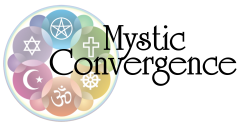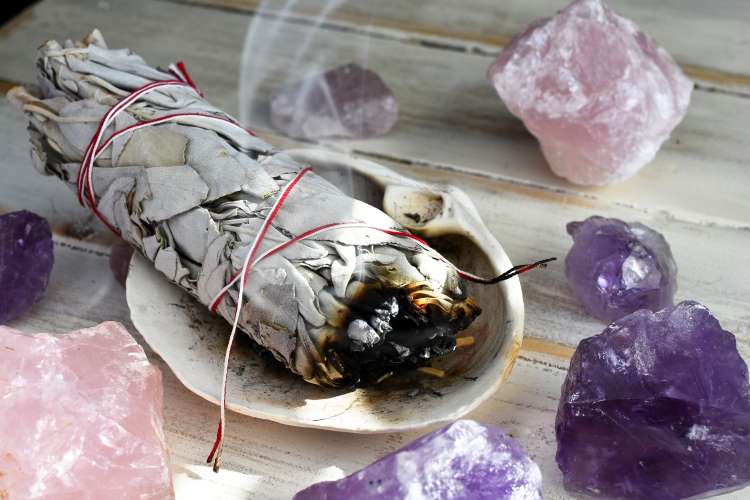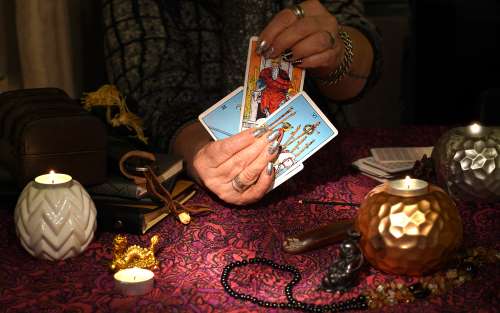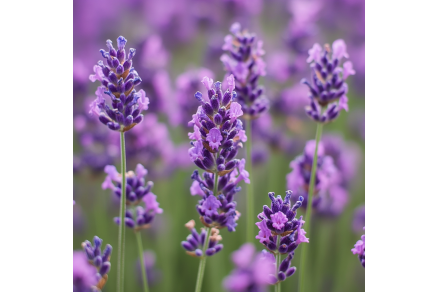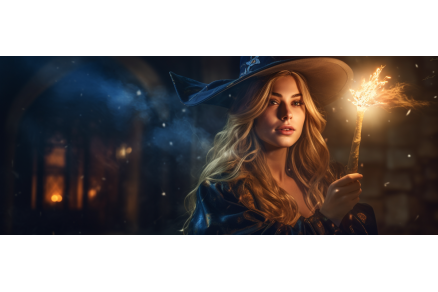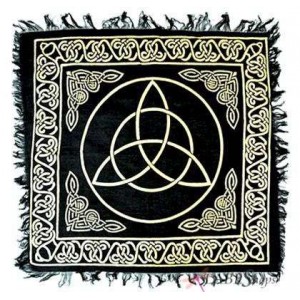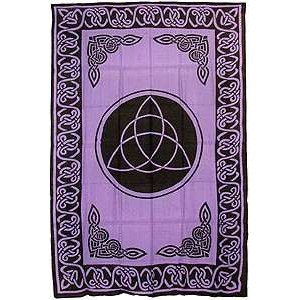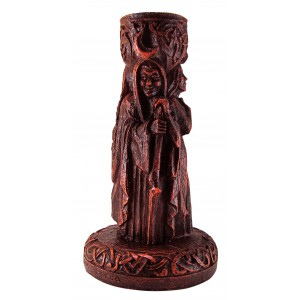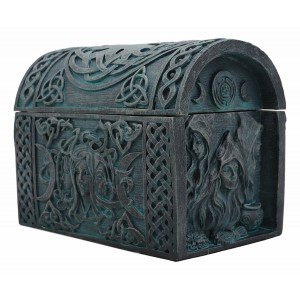The Triquetra in Religion, Myth and Media: Beyond the Knot
- November 11, 2023
- 1616
- 0
In the tapestry of symbols that span across cultures and eras, few are as enigmatic and widespread as the triquetra. This ancient motif, with its three interlocked arcs, whispers tales of mysticism, spirituality, and the allure of the unknown. It's a symbol that has danced through the ages, adapting and enduring, from the stone-carved relics of Celtic art to the screens of Hollywood. And yes, if you're picturing the cover of the "Book of Shadows" from the hit TV show "Charmed," you're right on track. But the triquetra's story stretches far beyond the realms of television fantasy, into the very real histories of religions and traditions across the world.
 The triquetra, from the Latin "triquetrus," meaning "three-cornered," is a triangular figure composed of three interlaced arcs or three overlapping vesicae piscis lens shapes. It is a symbol used in various forms of art and architecture, particularly noted in medieval manuscript illumination within the Insular tradition. Its design as interlaced is a common feature in Insular ornaments dating back to around the 7th century, representing the simplest possible knot.
The triquetra, from the Latin "triquetrus," meaning "three-cornered," is a triangular figure composed of three interlaced arcs or three overlapping vesicae piscis lens shapes. It is a symbol used in various forms of art and architecture, particularly noted in medieval manuscript illumination within the Insular tradition. Its design as interlaced is a common feature in Insular ornaments dating back to around the 7th century, representing the simplest possible knot.
The triquetra has been found on runestones in Northern Europe and on early Germanic coins, bearing a resemblance to the valknut, a symbol of three interlacing triangles. In early Christian art, the triquetra is interpreted as representing the Holy Trinity, especially after the Celtic revival of the 19th century, though the original intention by early medieval artists is unknown.
In Christian contexts, the triquetra came to represent the Holy Trinity—Father, Son, and Holy Spirit—while maintaining its elegant and symmetrical aesthetic. This ability to bridge diverse interpretations and beliefs is a testament to the triquetra’s universal appeal.
It is also a beloved motif among neopagan groups, including Wiccans, where it holds deep spiritual meaning. The symbol is frequently used to represent the Triple Goddess or other divine trinities, such as mind, body, and spirit.
Popular culture has further elevated the triquetra’s recognition. It has appeared in the TV shows "Charmed" and "The Walking Dead," symbolizing themes of unity and resilience. In the film series "Thor," the triquetra highlights concepts of time loops and cosmic connections, reinforcing its timeless significance.

Mother, Maiden & Crone - the Triple Goddess associated with the Triquetra Symbol
The Wiccan interpretation of the triquetra connects deeply with the cycles of life and nature. It is seen as a dynamic emblem of life's continuity, embodying the idea that every ending heralds a new beginning. The triquetra resonates with beliefs in reincarnation and the interconnectedness of all life, serving as a visual reminder of the universe’s endless rhythms.
 When "Charmed" first graced our television screens in the late '90s, it brought with it a surge of interest in all things magical – and the triquetra was at the heart of it all. Emblazoned on the Halliwell sisters' "Book of Shadows," the symbol became synonymous with the Power of Three, the bond that granted them their powers to protect the innocent and vanquish evil. It was more than just a prop; it was a character in its own right, a silent guardian of the sisters' witchy heritage.
When "Charmed" first graced our television screens in the late '90s, it brought with it a surge of interest in all things magical – and the triquetra was at the heart of it all. Emblazoned on the Halliwell sisters' "Book of Shadows," the symbol became synonymous with the Power of Three, the bond that granted them their powers to protect the innocent and vanquish evil. It was more than just a prop; it was a character in its own right, a silent guardian of the sisters' witchy heritage.
The triquetra in "Charmed" represents unity and strength through connection, qualities that echo its historical use as a symbol of protection and balance. For the Halliwell sisters, it symbolized their magical bond and the unbreakable ties of family—a modern interpretation of an ancient idea.
This iconic symbol’s presence in both ancient carvings and contemporary pop culture highlights its timeless resonance. The triquetra invites us to explore the threads that connect past, present, and future—a journey as eternal as the unbroken loops of its design.
What is a Triquetra?
 The triquetra, from the Latin "triquetrus," meaning "three-cornered," is a triangular figure composed of three interlaced arcs or three overlapping vesicae piscis lens shapes. It is a symbol used in various forms of art and architecture, particularly noted in medieval manuscript illumination within the Insular tradition. Its design as interlaced is a common feature in Insular ornaments dating back to around the 7th century, representing the simplest possible knot.
The triquetra, from the Latin "triquetrus," meaning "three-cornered," is a triangular figure composed of three interlaced arcs or three overlapping vesicae piscis lens shapes. It is a symbol used in various forms of art and architecture, particularly noted in medieval manuscript illumination within the Insular tradition. Its design as interlaced is a common feature in Insular ornaments dating back to around the 7th century, representing the simplest possible knot.The triquetra has been found on runestones in Northern Europe and on early Germanic coins, bearing a resemblance to the valknut, a symbol of three interlacing triangles. In early Christian art, the triquetra is interpreted as representing the Holy Trinity, especially after the Celtic revival of the 19th century, though the original intention by early medieval artists is unknown.
Historical Roots and Cultural Significance
The triquetra symbol has roots that weave through both pagan and Christian traditions. Its early appearances on Celtic monuments and artifacts suggest that it symbolized triplicity in nature—such as life, death, and rebirth or land, sea, and sky. For pagans, particularly those following pre-Christian Celtic spiritualities, the triquetra may have represented the interconnectedness of all existence.In Christian contexts, the triquetra came to represent the Holy Trinity—Father, Son, and Holy Spirit—while maintaining its elegant and symmetrical aesthetic. This ability to bridge diverse interpretations and beliefs is a testament to the triquetra’s universal appeal.
The Triquetra in Modern Culture
In modern times, the triquetra often features prominently in Celtic knotwork designs, appearing in jewelry, tattoos, and art. It's a staple in Irish and Scottish cultural representations, often symbolizing unity and eternity.It is also a beloved motif among neopagan groups, including Wiccans, where it holds deep spiritual meaning. The symbol is frequently used to represent the Triple Goddess or other divine trinities, such as mind, body, and spirit.
Popular culture has further elevated the triquetra’s recognition. It has appeared in the TV shows "Charmed" and "The Walking Dead," symbolizing themes of unity and resilience. In the film series "Thor," the triquetra highlights concepts of time loops and cosmic connections, reinforcing its timeless significance.
The Triquetra and the Triple Goddess
For those who follow the path of Wicca, the triquetra serves as a beacon of the divine feminine. It's a symbol that captures the essence of the Triple Goddess – the Maiden, the Mother, and the Crone. Each point of the triquetra represents one aspect of the Goddess, embodying her journey from the youthful innocence to the nurturing presence, and finally, the wisdom of age. It's a cycle that mirrors the moon's own waxing, full, and waning, a celestial dance that's as rhythmic as it is mystical.
Mother, Maiden & Crone - the Triple Goddess associated with the Triquetra Symbol
The Wiccan interpretation of the triquetra connects deeply with the cycles of life and nature. It is seen as a dynamic emblem of life's continuity, embodying the idea that every ending heralds a new beginning. The triquetra resonates with beliefs in reincarnation and the interconnectedness of all life, serving as a visual reminder of the universe’s endless rhythms.
The Triquetra and "Charmed"
 When "Charmed" first graced our television screens in the late '90s, it brought with it a surge of interest in all things magical – and the triquetra was at the heart of it all. Emblazoned on the Halliwell sisters' "Book of Shadows," the symbol became synonymous with the Power of Three, the bond that granted them their powers to protect the innocent and vanquish evil. It was more than just a prop; it was a character in its own right, a silent guardian of the sisters' witchy heritage.
When "Charmed" first graced our television screens in the late '90s, it brought with it a surge of interest in all things magical – and the triquetra was at the heart of it all. Emblazoned on the Halliwell sisters' "Book of Shadows," the symbol became synonymous with the Power of Three, the bond that granted them their powers to protect the innocent and vanquish evil. It was more than just a prop; it was a character in its own right, a silent guardian of the sisters' witchy heritage.The triquetra in "Charmed" represents unity and strength through connection, qualities that echo its historical use as a symbol of protection and balance. For the Halliwell sisters, it symbolized their magical bond and the unbreakable ties of family—a modern interpretation of an ancient idea.
The Timeless Appeal of the Triquetra
So, what does the triquetra mean today? For some, it’s a symbol of spiritual beliefs or cultural identity; for others, it’s simply an elegant design steeped in historical mystique. Whether you view it as a representation of the Triple Goddess, the Holy Trinity, or the enduring cycles of life, the triquetra remains a bridge between the ancient and the modern.This iconic symbol’s presence in both ancient carvings and contemporary pop culture highlights its timeless resonance. The triquetra invites us to explore the threads that connect past, present, and future—a journey as eternal as the unbroken loops of its design.
Related Posts
Magic Wands: Making Magic Throughout History
- 3197
- 0
In this exploration, we'll embark on a captivating journey to uncover the varied roles and spiritual significance of magic wands.
